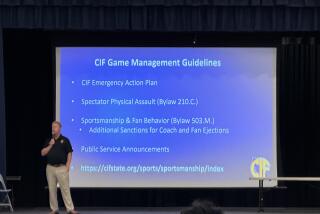Prep Situation Is Cut and Ride
- Share via
Like a quarterback trying to avoid a big hit, high school athletic officials are scrambling to reduce costs in anticipation of cuts aimed at trimming the $38-billion state budget deficit.
They’re not eliminating sports -- at least not yet -- but they are changing the way many athletes will get to their games.
The big, yellow school bus is on its way out; personal transport is in.
“Students will possibly be driving to events either by themselves or, depending on what [administrators] come up with, other athletes or other parents,” said Joe Carlson, athletic director at Long Beach Poly High, one of six high schools in the Long Beach Unified School District that will share in reductions of more than $250,000 the next two years.
For Long Beach schools, that means what they used to spend on transportation for sports teams is being halved. Similar cuts are being made across Southern California as high schools face what experts project will be an overall reduction of about $1.5 billion in spending.
A few, such as those in the William S. Hart Union School District, already have implemented new travel policies.
Boys and girls basketball players from Newhall Hart, Canyon Country Canyon, Valencia and Saugus high schools last year were allowed to provide their own transportation to and from night games played within the Santa Clarita Valley. The next step might be to make such arrangements mandatory.
However, even when parents sign forms authorizing their children to drive themselves, law experts are split as to whether a school district has liability if there is an accident.
Some say the courts could hold the schools financially accountable because the athletes would be attending a school-sponsored event where their attendance is mandatory. Others say the districts would be safe, but the carpool drivers themselves would be taking on additional liability.
“You couldn’t sue anybody if a coach was driving,” said Matthew McNicholas, a Los Angeles attorney who has experience in injury and liability cases, “but if you have parents, cousins or uncles driving, you could sue them because they’re not a district employee.”
There are other practical concerns.
Troy Werner, a Canyon High distance runner, chose to ride with his parents instead of taking the bus to the Southern Section track and field preliminaries last spring at Long Beach City College. Stuck in traffic and eventually lost, he arrived at the meet just in time to see his competitors come onto the track for the start of the race.
“I was still in my street clothes,” Werner said. “I just got my uniform on real quick and jumped around on the line a little bit before the [starting] gun went off. Luckily there was a slow first lap. I got a little warmup in there.”
Werner finished second in the race, fortunate, he said, that it was only a prelim and not the final. “I would have gotten destroyed [in the final],” he said.
The American Civil Liberties Union opposes athletes being asked to make their own transportation arrangements, and a high-ranking official within the organization said it was a symptom of a “third-class education.”
“It would concern me as a question of public safety and it would concern me as a parent,” said Mark Rosenbaum, legal director of the ACLU’s Southern California branch. “The question for the state is whether it’s serious about giving kids a decent education. Sports are a part of it. Kids ought not to be thinking about how they’re going to get to a game.”
But school officials insist spending adjustments need to be made to assure there are still games to attend.
“The alternative is you start eliminating teams,” said Rory Livingston, an assistant superintendent for the Hart district.
Livingston said his district did not receive an accident claim last year in connection with an athletic event. For competition outside the Hart district, athletes used transportation provided by their schools. For example, members of the Saugus boys’ cross-country team raised $1,600 last year to pay for buses for two meets.
“We don’t want our kids leaving at 5 o’clock in the morning and driving to Ventura,” said Arlene Braunstein, whose son, Matt, will be a senior on the Saugus team this year. “It affects us all. The kids are the ones who are going to suffer.”
In another money-saving move, the Hart district last year also had teams from different schools share buses to some swimming and track and field meets outside the district.
“It’s a little pressure to keep everyone settled down, especially if they compete against each other,” said Enrique Lopez, Valencia’s athletic director, “but that’s what we’re doing.”
Other districts are trying to generate funds. Athletes from the five high schools in the Capistrano Unified School District this year will be asked for the first time to pay a “transportation fee” -- on a sliding scale from $65-$100 for each athlete per season.
Tom White, the district’s athletic director, said officials hope the fee raises about $400,000 to offset some travel expenses. Already, each school’s athletic program has been told to trim 10% of what it used to offer in stipends for coaches. “I want to do everything I can to avoid cutting programs,” White said.
Avoiding cuts that would eliminate sports or non-varsity teams is also the goal in the Los Angeles Unified School District.
City Section schools are preparing to significantly alter their game schedules for the upcoming school season so that teams from different sports might share a bus to road games.
In one proposal, girls’ volleyball and tennis teams will share a bus during the fall, and boys’ volleyball and tennis will share during the spring. Soccer and basketball teams might share buses during the winter.
Such a move could save the district -- which pays $205 for each bus -- about $200,000 in a school year. Several athletes interviewed for this story said they didn’t mind either sharing buses or carpooling. However, doubling up the teams on a bus has raised concern among parents who worry whether their children will be supervised as they are waiting for other teams to start or finish.
“Kids won’t wait two minutes, let along wait an hour or two,” said Rich Ganz, whose daughter, Stacy, is a Chatsworth High volleyball player. “That would be the big concern, to make sure supervision is being done all the time. If not, all the parents will be jumping up and down.”
City Section Commissioner Barbara Fiege said she’d rather have athletes and parents inconvenienced than have others unable to participate at all. “My hope has been to look at this crisis and ask what we can do to not take games away from kids,” she said. “It may be more painful than it was last year with two teams going on a bus together, but it makes sense. We have set up our schedules that way to make it happen.”
For those who will have to wait, Fiege offered this advice:
“Bring a book.”
More to Read
Go beyond the scoreboard
Get the latest on L.A.'s teams in the daily Sports Report newsletter.
You may occasionally receive promotional content from the Los Angeles Times.











